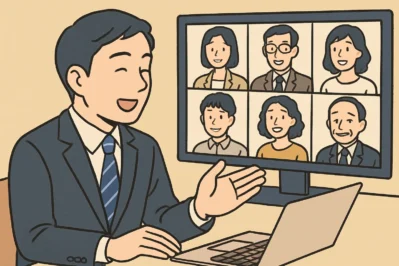Unmute Yourself: Shine in Korean Online Meetings!
Hello! This is [Maeil Hangeul], here to upgrade your Korean skills!
Are you working with a Korean company or team? With more and more meetings happening online, it can be tricky to know when and how to speak up. Today, we’re going to learn some essential phrases to help you confidently share your ideas during a Korean video conference.
Nowadays in Korea, 재택근무 (jaetaek-geunmu, remote work) is becoming very common, especially in tech and creative industries. This means mastering online meeting etiquette is more important than ever! Let’s learn how to unmute yourself and shine!
Key Expressions for Your Next Video Call
Here are four must-know phrases that will make you sound professional and respectful in any online meeting.
1. To Politely Interject: 잠시만요, 제가 의견 하나만 내도 될까요?
- Pronunciation [Romanized]: Jam-si-man-yo, je-ga ui-gyeon ha-na-man nae-do dwel-kka-yo?
- English Meaning: Excuse me for a moment, may I offer an opinion?
- Detailed Explanation: This is the perfect, polite way to jump into a conversation without seeming rude.
- 잠시만요 (Jamsimanyo) means “just a moment.”
- 의견을 내다 (uigyeoneul naeda) means “to give an opinion.”
- The grammar pattern -아/어도 될까요? (-a/eodo dwelkayo?) is a very polite way to ask for permission, “May I…?” It’s much softer than just starting to speak.
2. To Agree Formally: 네, 그 의견에 동의합니다.
- Pronunciation [Romanized]: Ne, geu ui-gyeon-e dong-ui-ham-ni-da.
- English Meaning: Yes, I agree with that opinion.
- Detailed Explanation: In a business setting, this is the standard, formal way to show agreement. 동의합니다 (donguihamnida) is the formal version of “I agree.” Using this instead of the more casual “맞아요 (majayo)” shows your professionalism and respect for the speaker.
3. To Ask for Clarification: 그 부분에 대해 조금 더 자세히 설명해 주실 수 있나요?
- Pronunciation [Romanized]: Geu bu-bun-e dae-hae jo-geum deo ja-se-hi seol-myeong-hae ju-sil su in-na-yo?
- English Meaning: Could you please explain that part in a little more detail?
- Detailed Explanation: This phrase is a lifesaver when you’re not 100% sure what’s being discussed. It shows you are paying close attention and want to understand completely.
- 그 부분 (geu bubun) means “that part.”
- 자세히 (jasehi) means “in detail.”
- -아/어 주실 수 있나요? (-a/eo jusil su innayo?) is a polite request: “Could you please do… for me?”
4. To Politely Disagree: 좋은 의견이시네요. 그런데 제 생각은 조금 다릅니다.
- Pronunciation [Romanized]: Jo-eun ui-gyeon-i-si-ne-yo. Geu-reon-de je saeng-gak-eun jo-geum da-reum-ni-da.
- English Meaning: That’s a good opinion. However, my thought is a little different.
- Detailed Explanation: Directly saying “I disagree” can sound too strong in Korean workplace culture. This two-step approach is much better. First, you acknowledge and validate the other person’s idea with 좋은 의견이시네요 (That’s a good opinion). Then, you gently introduce your own viewpoint with 그런데 제 생각은 조금 다릅니다 (However, my thought is a little different).
Example Dialogue
Let’s see how these phrases work in a real meeting! Here, Mark is in a video conference with his team leader, 팀장님 (Timjangnim).
- 팀장님: “For the new ‘Seoul Smart’ project, I think we should focus only on Instagram marketing.”
(새로운 ‘서울 스마트’ 프로젝트는 인스타그램 마케팅에만 집중하는 게 좋겠습니다.) -
Mark: “잠시만요, 팀장님. 제가 의견 하나만 내도 될까요?”
(Excuse me, Team Leader. May I offer an opinion?) -
팀장님: “Of course, Mark. Please share.”
(네, 마크 씨. 말씀하세요.) -
Mark: “Using Instagram is a great idea. 네, 그 의견에 동의합니다. However, what if we also collaborate with tech YouTubers?”
(인스타그램을 활용하는 것은 좋은 생각입니다. 네, 그 의견에 동의합니다. 그런데 테크 유튜버들과 협업하는 것은 어떨까요?) -
팀장님: “Hmm, YouTubers… That’s interesting. 그 부분에 대해 조금 더 자세히 설명해 주실 수 있나요?”
(흠, 유튜버라… 흥미롭네요. 그 부분에 대해 조금 더 자세히 설명해 주실 수 있나요?)
See how Mark used the phrases to participate actively and politely? You can do it too!
Culture Tip & Trend Deep Dive
In traditional Korean offices, communication is often top-down and face-to-face. The rise of remote work is changing this! However, the cultural concept of 눈치 (nunchi)—the ability to “read the room” and understand social cues—is still very important.
It can be much harder to use your nunchi in a video call when you can’t see everyone’s body language. That’s why using clear, polite, and structured phrases like the ones we learned today is so crucial. They help you communicate your intentions clearly without causing misunderstandings. Using these phrases shows that you not only speak Korean but also understand the nuances of Korean workplace culture. You’ll look like a pro!
Let’s Review and Practice!
Great job today! We learned four key phrases to help you speak up confidently and politely in Korean video meetings. Now it’s time to test your knowledge.
- Fill in the blank: You want to politely agree with your colleague’s idea.
- 네, 그 의견에 __________.
- Sentence Building: You have a different idea from your boss. How can you say, “That’s a good opinion. However, my thought is a little different”?
Leave your answers in the comments below! We’d love to see you try making your own sentences with today’s expressions.
Happy learning, and see you next time






